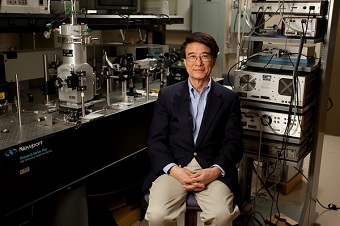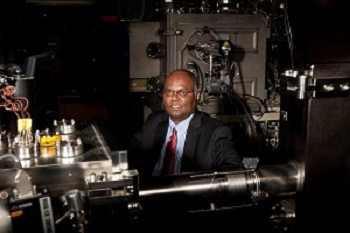Chu, Selvamanickam Honored at Superconductivity Conference
UH Researchers Will Be Recognized for Their Contributions to the Field
Two of the University of Houston’s leading superconductivity researchers will be honored this month at the Applied Superconductivity Conference in Charlotte, N.C.

Paul Chu will receive the Max Swerdlow Award for Sustained Service to the Applied
Superconductivity Community.Paul C.W. Chu, TLL Temple Chair of Science, founding director and chief scientist
of the Texas Center for Superconductivity at UH, will receive the 2014 Institute of
Electrical and Electronic Engineers (IEEE) Council on Superconductivity Max Swerdlow
Award for Sustained Service to the Applied Superconductivity Community.
Venkat Selvamanickam, M.D. Anderson Chair professor of mechanical engineering, professor of physics and director of the Applied Research Hub at the Texas Center for Superconductivity, will receive the inaugural IEEE Dr. James Wong Award for Continuing and Significant Contributions to Applied Superconductor Materials Technology.
The awards will be presented during the opening session of the conference, which begins Aug. 11.

Venkat Selvamanickam will receive the James Wong Award for Continuing and Significant
Contributions to Applied Superconductor Materials Technology.The Swerdlow award, named for the late Max Swerdlow, longtime program manager for
superconductivity for the U.S. Air Force Office of Scientific Research (AFOSR), recognizes
sustained leadership and exceptional service to the applied superconductivity community.
Chu said the fact that the award is connected to Swerdlow and the office he managed for so long makes the honor distinctive.
“The honor is special for me, not because of my contribution but more because of Swerdlow and AFOSR,” he said. “It was funding from Max Swerdlow and AFOSR to my advisor, Bernd Matthias, that supported my graduate work in the ’60s, and it is the partial funding from AFOSR that allows me to explore my imagination today.”
The Swerdlow award requires honorees to have had a lasting influence on the advancement of superconducting technology either through exceptional service to and leadership within the community, the formation and promotion of major programs in applied superconductivity or through leadership and management roles in major research organizations.
Chu is credited with meeting all three criteria. He led a research team in 1987 that discovered a compound that acted as a superconductor at a temperature above the boiling point of liquid nitrogen; he still holds the record for high temperature superconductivity.
This is the first year for the James Wong award, which recognizes a living individual for technical contributions to the field of applied superconductor materials technology, based on innovative concepts and theories, and the impact of the recipient’s contributions on the field.
Wong, founder of Supercon Inc., was honored by the IEEE Council on Superconductivity in 2011 for his work in producing commercial grade superconducting cables and conductors.
Selvamanickam co-founded SuperPower, which produces high temperature superconducting electrical wire, in 2000; there he led the development of technologies to convert a brittle ceramic superconductor into a flexible wire that has 300 times the current-carrying capacity of a comparably-sized copper wire. He led the organization to multiple world records for the highest performance wire over several length scales, the longest thin film superconductor wire made, first to pilot manufacturing and commercialization.
He brought the research division of SuperPower with him when he was hired by UH in 2008. At UH, his team has recently tripled the performance of the superconducting wires in a project on superconducting wind generators funded by the Advanced Research Projects Agency-Energy. He also established a pilot-scale superconducting wire manufacturing research facility at the UH Energy Research Energy Park, with support from the state of Texas Emerging Technology Fund.
Selvamanickam said it has been a privilege to spend his career working to develop processing technologies to engineer complex materials into practical forms.
“I am honored to have worked with and continue working with a great group of innovators in the field of superconducting wire technology and to be recognized with this award,” he said.
- Jeannie Kever, University Communication